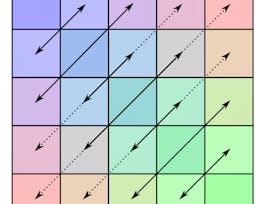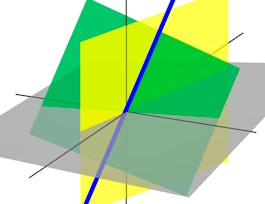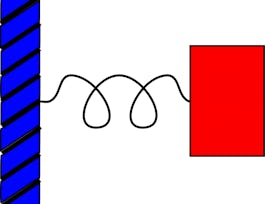This course is the second course in the Linear Algebra Specialization. In this course, we continue to develop the techniques and theory to study matrices as special linear transformations (functions) on vectors. In particular, we develop techniques to manipulate matrices algebraically. This will allow us to better analyze and solve systems of linear equations. Furthermore, the definitions and theorems presented in the course allow use to identify the properties of an invertible matrix, identify relevant subspaces in R^n,


Linear Algebra: Matrix Algebra, Determinants, & Eigenvectors
This course is part of Linear Algebra from Elementary to Advanced Specialization
Taught in English

Instructor: Joseph W. Cutrone, PhD
Top Instructor
Included with 
Course
(20 reviews)
Details to know

Add to your LinkedIn profile
18 quizzes
Course
(20 reviews)
See how employees at top companies are mastering in-demand skills

Build your subject-matter expertise
- Learn new concepts from industry experts
- Gain a foundational understanding of a subject or tool
- Develop job-relevant skills with hands-on projects
- Earn a shareable career certificate


Earn a career certificate
Add this credential to your LinkedIn profile, resume, or CV
Share it on social media and in your performance review

There are 6 modules in this course
In this module, we now look at what arithmetic operation we can perform on nxm matrices and how these operations correspond to operations on functions. In particular, we will view at matrix multiplication AB as a composition of function A(B(x)). In this way, algebraic properties like non-commutativity will become more apparent. We will also look for those matrices that are invertible. Since we no longer have the Horizontal Line Test, new tests for invertibility will be needed. This will lead to the study of the very important matrix invariant, the determinant.
What's included
3 videos2 readings3 quizzes
In this module we investigate the structure of R^n by formally defining the notion of a subspace. These special sets are those that look like smaller versions of R^n that pass through the origin. These subsets have invariants called a dimension which captures a notion of size. The linear algebra definition of dimension, which uses the notion of linearly independent vectors, matches our intuition in low dimensions where lines have dimension one and planes have dimension two. These sets, and their sizes, turn out to be another tool to student matrices as functions as both the zeros and image of a matrix are subspaces of R^n.
What's included
2 videos2 readings3 quizzes
The determinant is a real number calculated from a square matrix that determines the invertibility of a square matrix. Its value characterizes the invertibility of the matrix. The determinant also has a geometric meaning: the absolute value of the determinant scales the volumes of sets under the function. In this module, we will show how to calculate the determinant of nxn matrices and study its properties.
What's included
3 videos3 readings4 quizzes
In this module we study special vectors, called eigenvectors, of a linear transformation defined by a square matrix A. These are vectors whose image is easily visualized as they are scaled by a real number called the eigenvalue. While eigenvalues can be complex numbers, we do not consider that case in this course. Eigenvalues and eigenvectors are central to the theory of discrete dynamical systems, differential equations, and Markov chains and the eigentheory presented here also appear in settings in more advanced pure math courses.
What's included
2 videos2 readings3 quizzes
In this module we continue our study of eigenvalues and eigenvectors, in particular how they relate to diagonalizable matrices. Eigenvectors are so important: they make understanding linear transformations easy. They are the "axes" (directions) along which a linear transformation acts simply by "stretching/compressing" and/or "flipping"; eigenvalues give you the factors by which this compression occurs. The more directions you have along which you understand the behavior of a linear transformation, the easier it is to understand the linear transformation; so you want to have as many linearly independent eigenvectors as possible associated to a single linear transformation.
What's included
2 videos2 readings3 quizzes
Congratulations on reaching the final assessment! Review all vocabulary and theorems before attempting the final quiz below. Think about what each theorem is saying both algebraically as well as geometrically. Provide examples (with pictures in R^2 and R^3) along with counterexamples of each theorem and vocabulary term. Lastly, be sure to work through some examples for computation, looking for any of the shortcuts in the calculations when possible. In addition, there is an optional project that applies the theory of this course. You will see how eigenvalues and eigenvectors are applied to Markov Chains and the Google Page Rank algorithm. I strongly recommend you attempt this project. Good luck!
What's included
1 reading2 quizzes
Instructor

Offered by
Recommended if you're interested in Machine Learning

Johns Hopkins University

Johns Hopkins University

Johns Hopkins University

The Hong Kong University of Science and Technology
Why people choose Coursera for their career




Learner reviews
Showing 3 of 20
20 reviews
- 5 stars
85%
- 4 stars
15%
- 3 stars
0%
- 2 stars
0%
- 1 star
0%
Reviewed on Dec 27, 2023
New to Machine Learning? Start here.

Open new doors with Coursera Plus
Unlimited access to 7,000+ world-class courses, hands-on projects, and job-ready certificate programs - all included in your subscription
Advance your career with an online degree
Earn a degree from world-class universities - 100% online
Join over 3,400 global companies that choose Coursera for Business
Upskill your employees to excel in the digital economy
Frequently asked questions
Access to lectures and assignments depends on your type of enrollment. If you take a course in audit mode, you will be able to see most course materials for free. To access graded assignments and to earn a Certificate, you will need to purchase the Certificate experience, during or after your audit. If you don't see the audit option:
The course may not offer an audit option. You can try a Free Trial instead, or apply for Financial Aid.
The course may offer 'Full Course, No Certificate' instead. This option lets you see all course materials, submit required assessments, and get a final grade. This also means that you will not be able to purchase a Certificate experience.
When you enroll in the course, you get access to all of the courses in the Specialization, and you earn a certificate when you complete the work. Your electronic Certificate will be added to your Accomplishments page - from there, you can print your Certificate or add it to your LinkedIn profile. If you only want to read and view the course content, you can audit the course for free.
If you subscribed, you get a 7-day free trial during which you can cancel at no penalty. After that, we don’t give refunds, but you can cancel your subscription at any time. See our full refund policy.

